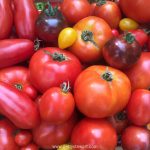By Symone Moodoo, RD
Do you ever look in the fridge and find groceries that have gone bad because you either a) may have forgotten the food you bought earlier in the week or b) just didn’t have the time to eat it all before it went bad?? I think a lot of us can relate and have experienced food waste at one point in time.
The following is a list of things you can try to help reduce the amount of food that gets thrown out weekly:
- Practice meal planning.
- This will allow you to purposely plan out when you will use up leftover produce and other food items in the fridge helping to reduce food waste.
- Avoid over buying food items you already have on hand.
- To help combat this, try conducting an inventory of what you already have in the house and then only placing items you need on a list that you will take with you when grocery shopping.
- Properly store produce to preserve shelf life.
- APPLES – store in the crisper of the fridge
- AVOCADOS – store on the counter until its ripe. Once ripe, store in the fridge. If only eating a section of the avocado, be sure to store the remaining avocado in the fridge with its pit still intact.
- HERBS and VEG LIKE ASPARAGUS AND BROCCOLI – store in a jar of water upright in the fridge.
- LEAFY GREENS – wash and dry properly and then wrap in paper towel and place in a zip-lock bag in the fridge.
- Food items such as BREAD – keep in the fridge after a couple of days on the counter. Once the bread becomes closer to expiry, store bread in freezer until ready to use.
- Opt for purchasing canned and frozen vegetable and fruit options as these choices will have a longer shelf-life.
- Make baked goods with over ripe fruit (i.e. bananas à banana bread). You could also try freezing chucks of the fruit to use in smoothies.
- Use leftovers such as food scraps as fertilizer by setting up a composting area in your backyard.
- Ever notice those pieces of veg that you end up discarding??
- Try boiling those vegetable scraps in a pot of water to make vegetable stock to use in future dishes that week.
- Donate / give leftover food items that you will not be using to neighbours, friends or food banks.
- This will help ensure the food gets used up and does not go to waste.
Implementing even one or two of these strategies will make a difference in the amount of food that gets thrown out weekly.
Symone Moodoo is a Registered Dietitian at Save-on-Foods in Manitoba and worked with the Farm to School Manitoba program.






